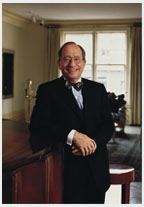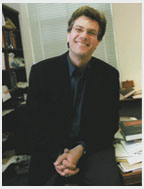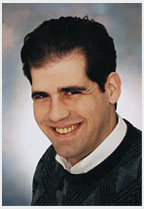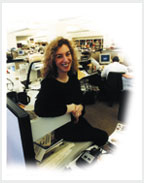|
January 24, 2001: Class Notes Class Notes Features: William Zabel '58, human rights activist, takes on the NYPD Law professor turned TV commentator: Election law expert Richard Pildes '79 moved into the spotlight David Tepper '94 fulfills childhood dream: By landing a spot on Jeopardy! Keeping up with intellectuals: Patricia Cohen *86 makes rigorous thinking accessible Email your class notes...many secretaries have email. Check our online Class Secretaries Directory.
In an entire lifetime,
one may never have his or her deepest convictions truly tested.
Others, like New York attorney William D. Zabel ’58, a human
rights activist, seem to be tested all the time. One of Zabel’s
earliest trials came in 1955, during his freshman year at Princeton,
when a trio of gun-toting students in Ku Klux Klan outfits burst
into his dorm room. They harassed Zabel because he had recently
written a letter to a prominent national magazine denouncing a Mississippi
jury’s decision to acquit two white men accused in the much-publicized
murder of Emmett Till, a young black man. The attempt at intimidation
had little effect on Zabel’s commitment. Neither did fire-bomb-tossing
rednecks in Canton, Mississippi, where in the 1960s Zabel did pro
bono legal work for civil rights activists, nor the repressive policies
of Pinochet’s Chile, where he worked with attorneys who risked
their lives representing victims of state-sanctioned violence. Although Zabel made his
name professionally as a trust and estate attorney in the Manhattan
law firm he cofounded, Schulte Roth & Zabel, he has always found
time to pursue his avocation, participating for more than 40 years
in battles over human Now, as chairman of the
Lawyers Committee for Human Rights, Zabel has turned his attention
to a problem much closer to home: the strained relationship between
the New York City Police Department and the city’s minority
communities. “We are trying to find a way to develop mutual
respect between the police and the communities that feel they are
being mistreated by them,” he says. Although his activism
through the years has often brought him face-to-face with injustice
and inhumanity, Zabel maintains that the benefits outweigh the costs.
“It is very rewarding work,” he says. “Human rights
is kind of the religion of the 21st century; it is a universally
bonding code.” By Rob Garver
Richard Pildes ’79
didn’t move to New York to become a media celebrity. But since
November, he’s been one. After the 2000 presidential election,
which left the media scrambling for people who could explain the
ensuing litigation to a confused populace, NBC hired him to be its
official commentator. A professor of election
law at New York University Law School in Manhattan, Pildes welcomed
the chance to explain the issues to a broad audience. “The
media find it difficult to represent in other than won-loss terms
legal decisions that are nuanced and subtle,” he says. “I
thought that one of my roles in commenting publicly was to resist
that tendency.” Pildes was well prepared
to do so after spending almost a decade helping write The Law of
Democracy (Foundation Press, 1998), a textbook that covers voting
rights acts, ballot initiatives, the Electoral College, and alternative
voting systems, among other topics. “I’ve been interested
in these issues for a number of years,” he says. At Princeton, Pildes
majored in chemistry, but he headed to Harvard Law School after
graduation and then clerked for Justice Thurgood Marshall on the
U.S. Supreme Court. He then joined the faculty at the University
of Michigan Law School before moving to NYU as a visiting professor.
He will become a full-time faculty member next fall. Although Pildes’s
ongoing appearances before the TV cameras will likely end now that
the election is finally resolved, his opportunities for public engagement
will not. He has been involved in several federal voting law cases
-- he’s worked as a court-appointed special expert, filed
amicus briefs, and helped represent North Carolina in a redistricting
case that has gone on for years -- and sees more looming. Referring
to the decennial redrawing of electoral districts, he predicts “a
great deal of legal uncertainty once we move into the redistricting
of the 2000 census.” By David Marcus ’92
David A. Tepper ’94
doesn’t consider himself religious, but since age 10, he has
revered one thing: TV’s Jeopardy! And on August 30, 2000, Tepper
went to Mecca. “Getting on Jeopardy!
has been a dream,” enthuses Tepper, who has had a hearing impairment
as long as he’s watched the show. But for this molecular biology
major turned bankruptcy lawyer, the dream had nothing to do with
money. “People who get
on Jeopardy! are very positive role models -- combining intelligence
and wit and grace under pressure,” says Tepper, who lives in
Richmond, Virginia. “I would much rather hang out with a Jeopardy!
player than [Survivor’s] Richard Hatch.” Afterwards, back at home,
says Tepper, “I spent the time practicing, keeping score, sometimes
standing up with a bright light shining on my face.” During
each night’s broadcast, Tepper and his parents used an intricate
scoring process to gauge how he’d do in actual competition. When it came to the real
thing, says Tepper, “I just concentrated on playing the game,
having a good time, and maybe being somebody that Middle America
could cheer for.” In four games, Tepper
won more than $25,000, which will help him move to Washington, D.C.,
where he hopes to land a government job. But his favorite parting
gift was a letter from a young hearing-impaired girl. “She
saw me on Jeopardy! and just lit up,” says Tepper. Recalling
his youthful admiration of the show’s contestants, he says,
“It just astonishes and humbles me that someone would think
the same about me.” By Rob Kutner ’94
When Patricia Cohen *86 arrived at the Woodrow Wilson School for her first semester, she had to fill out a form describing the details of her previous academic studies. “There was a space
to list what textbooks we’d read, and I wrote one line: ‘Intro
to Economics, a black textbook with red and yellow dots on it,’”
remembers Cohen. Her love for quantitative analysis didn’t
exactly blossom. “The one thing I remember was that most statistical
studies are worthless,” she says. “I keep that in mind
now.” Although Cohen, editor
of the New York Times’s Arts & Ideas section, eventually
came to appreciate the analytical framework she learned while earning
her MPA at WWS, her love of journalism quickly superseded any desire
for hard-core policy wonkdom. After graduating, she became an editorial
writer for New York Newsday and then held editorial posts at Rolling
Stone and the Washington Post. In 1997, she went to the New York
Times and launched Arts & Ideas, a Saturday section covering
the intellectual scene. Her job is the ultimate in intellectual eclecticism. On a Saturday last fall, the section featured pieces on a philosophy professor turned cyber-publishing guru and the warm reception given to American leftist thinkers in Europe, among other stories. While the very nature of journalism, she says, is to “drop into a place -- whether it be geographic or intellectual -- figure out what’s going on, and then make it accessible,” a section dealing with the notoriously Byzantine world of academia provides its own challenge. “Every story should
be understandable for an intelligent general reader who knows nothing
about the subject,” she says. And to keep her stories grounded,
she’s banned a whole cadre of academic words, including “social
construct,” “deconstruct,” and the adjectival use
of “postmodern.” Cohen is also dealing with new, nonwork challenges: In September 2000 she returned from maternity leave after giving birth to a son. “Coming back to work has been a lot more difficult than I ever anticipated,” she says. “So much of my identity has come through work, and suddenly this whole new aspect of life is competing.” By Katherine Hobson ’94 |
|||||||

 William
Zabel '58, human rights activist, takes on the NYPD
William
Zabel '58, human rights activist, takes on the NYPD Law
professor turned TV commentator: Election law expert Richard Pildes
'79 moved into the spotlight
Law
professor turned TV commentator: Election law expert Richard Pildes
'79 moved into the spotlight David
Tepper '94 fulfills childhood dream: By landing a spot on Jeopardy!
David
Tepper '94 fulfills childhood dream: By landing a spot on Jeopardy!
 Keeping
up with intellectuals: Patricia Cohen *86 makes rigorous thinking
accessible
Keeping
up with intellectuals: Patricia Cohen *86 makes rigorous thinking
accessible